CuratorLab is a one-year international curatorial course. We are exploring radical approaches to engagement, contributing to the pertinent conversations of our times, practicing curating beyond exhibition making, having collective fun and applying horizontal learning.
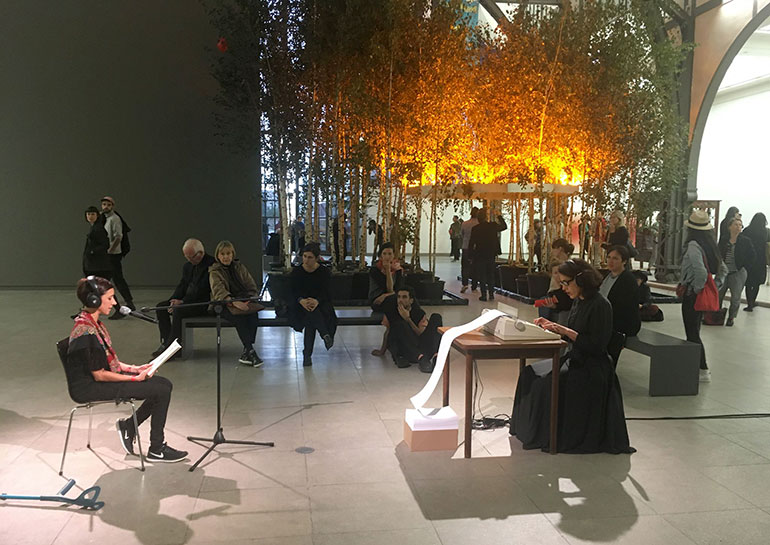
CuratorLab presents The Trial - II Processo, 2010-2017 of Rossella Biscotti at Hamburger Bahnhof, Berlin, 2017
One of our leading questions is how to understand - paraphrasing Audre Lorde - our interdependence in relation to our own individual power and creativity? Thus every year we work on one common topic where everyone contributes with their own sensibility. CuratorLab is open for all interested in collective work, thinking out of the box, and keen to form a solid research group sharing various understandings of the language of art.
Under the directorship of Joanna Warsza, in the recent years, we have tested advocacy as a curatorial form at the Visible Temporary Parliament; analyzed the topic of migration in the public collection of the Malmö Konstmuseum; co-edited a reader on love and revolution drawing on the legacy of the Bolshevik revolutionary Alexandra Kollontai together with the artist Dora García at Tensta Konsthall; re-staged the "Operaist Trial 1977-78" with the artist Rossella Biscotti at Hamburger Banhof in Berlin, curated the Degree Show of Konstfack in 2022, the public program of the 4. Autostrada Biennale in Kosovo and public programs in Kiruna at Konstmuseet I Norr.
CuratorLab is the oldest curatorial education in Sweden, established in 1999, and remains a platform open to everybody with curiosity to challenge and present various curatorial practices.
Course Director 2014-2024 / Senior lecturer Joanna Warsza is an interdependent curator, editor and writer. She was a co-curator of the Polish Pavilion at the 59th Venice Biennale with the work of Małgorzata Mirga-Tas, the first Roma artist in the history of the Biennale. Together with Övül Ö. Durmusoglu she co-curated Die Balkone in Berlin, the 3rd and the 4th Autostrada Biennale in Kosovo. She is an editor of several publications in the fields of politics, public sphere, performativity and feminist histories, recent ones including Red Love. A Reader on Alexandra Kollontai (co-edited with Maria Lind and Michele Masucci), and And Warren Niesłuchowski Was There: Guest, Host, Ghost (co-edited with Sina Najafi). Originally from Warsaw, she lives in Berlin and occasionally in Stockholm.
Guest lecturer since 2014: Maria Lind is a curator, writer and educator. She was the director of Stockholm's Tensta konsthall 2011-18, the artistic director of the 11th Gwangju Biennale, the director of the graduate program, CCS Bard College (2008-2010) and director of Iaspis in Stockholm (2005-2007). Since 2023 Maria Lind is a director of Konstmuseet I Norr in Kiruna.
Curatorial assistant for 2022/2023: Hana Halilaj is an independent curator and a recent graduate of Curatorial Studies at CCS Bard. She lives and works in Prishtina and serves as advisor, mediator and curatorial assistant between CuratorLab and the 4th Autostrada Biennale.
Curatorial assistant for 2023/2024: Anastasia Shestak
Term 2023/2024
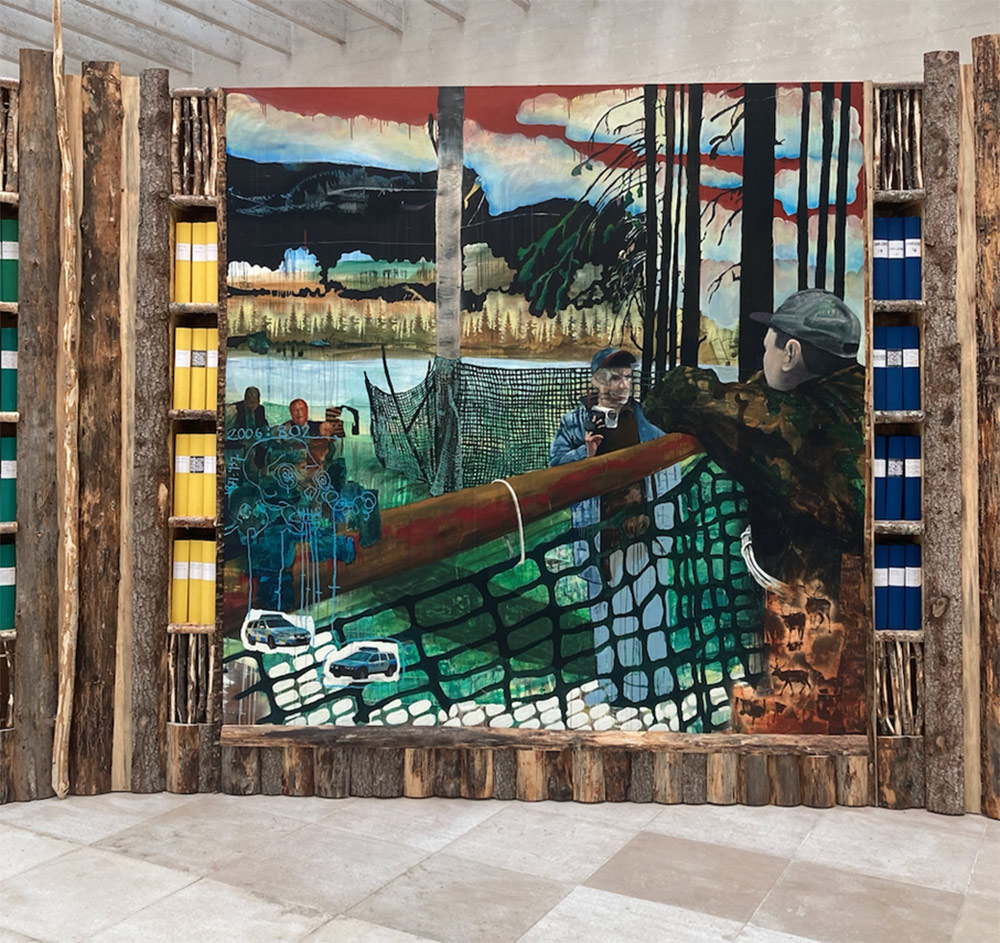
Anders Sunna, Illegal Spirits of Sápmi, 2022 (fragment) at The Sámi Pavilion, La Biennale di Venezia, 2022.
For the 2023-2024 academic year, we invited the participants to join CuratorLab led by Joanna Warsza and Maria Lind for collective research and work in and with the north of Sweden. The area making up the county of Norrland covers 60% of the country, and it is populated by about 10% of a populace out of 11 million people. It is part of Sápmi, the region inhabited by the Sámi spanning across Fennoscandia, between Northern and Eastern Europe.
The Sámi have been inhabiting Europe longer than anyone else, before national borders were established, and settler cultures became the norm. The area, which is rich in natural resources such as silver, iron ore and forests, was controlled, claimed and colonized by the Crown from the 14th century onwards, a form of exploitation that continues to this day. However, against many odds, Sámi traditional lifestyles, knowledge, craft and music have survived, and are practiced across the north.
Today industrialisation is expanding, with new mines and huge wind mill farms being established and vast internet server halls erected. At the same time, climate change is palpable, causing problems such as new layers of thin ice preventing the reindeer from grazing. The north is a place where the politics of extraction meet the need to cultivate vernacular ways of being. What do these changes mean for life in the region? What are their implications for the climate, the landscape, for the Sámi as well as for others living and working there? What can art and curating bring to the table, and how?
The course is realized in collaboration with Bildmuseet in Umeå and in a dialogue with local artists, partners such as Anders Sunna, Katarina Pirak Sikku, Katarina Spik Skum and many others. Under the working title “Life in the North”, a group of ten participants traveled to Umeå, Luleå, Jokkmokk, Kvikkjokk, Kiruna and other places to meet with artists and other cultural practitioners. The research trip will took place in early autumn 2023 and is followed by three intensive sessions leading to the final projects at Kiruna at the Konstmuseet I Norr, at the Galleri Syster i Luleå, at Havremagasinet in Boden and at Konstfack in Stockholm.
Participants: Silvia Colombo, Milan/Luleå, Aleksandra Kedziorek/Warsaw, Kerstin Möller, Berlin/Stockholm, Fann Xu/Falkenberg, Emma Pettersson Juntti/Malmberget, Liselotte Winka/Stockholm, Karin Erixon/Luleå, Ana Victoria Bruno/Buenos Aires/London, Sixten Liu/Gothenburg/London, Foteini Salvaridi/Athens.
Term 2022/2023
A year in which we work on public program of the 4th Autostrada Biennale in Kosovo and the notion of the biennales of resistance.
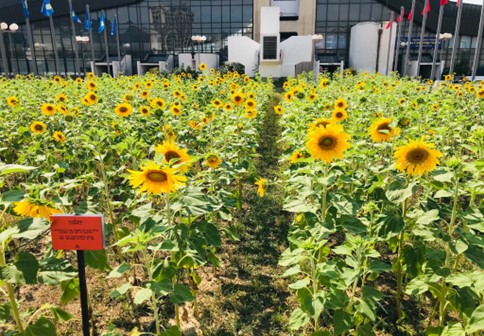
Agnes Denes, Sunflower Field, 3. Autostrada Biennale, Prishtina, 2021
Topic
For the academic year 2022/2023, we formed the team of researchers and public program curators for the 4th Autostrada Biennale, curated by Övül Ö. Durmusoglu and Joanna Warsza. Autostrada Biennale was established by two artists and a pedagogue in 2014 in Kosovo. As the only contemporary art institution in Prizren, it functions on two speeds: one is a physical exhibition taking place in the public space every two years, the second is a long-term educational center in the former KFOR military camp where the exhibition preparation process is open to the public, making the production of the artworks a form of learning and critical thinking.
Among the three hundred biennials in the world, there are biennales and biennales. Those second ones ‒ such as, in our belief, the Autostrada Biennale ‒ are more valuable to look at and work with from a critical, curatorial perspective. These have been called Biennales of Resistance by the political scientist Oliver Marchart and many have originated in the Global South such as the early Havana Biennial 1978, the Gwangju Biennale after the democratic uprising in South Korea in 1980, the short-lived Johannesburg Biennale after the end of apartheid in 1994, or the Istanbul Biennale after the 1980 military intervention in Turkey. Some of their aims were to de-westernize the art canon, decenter cartographies, shake legitimized institutional art, or create counter-hegemonic models. Autostrada Biennale responds to some of these needs, from the position of the Western Balkans. Kosovo is among the very few countries in Europe where a visa is still needed to travel in the EU, it is a post-war political entity only partially recognized, a corner where different ethnicities and religions breathe side-by-side, and finally, it is a place where the language of contemporary art is needed as a form of resilience and recovery.
The participants shape and reflect on the process of biennale-making in Prizren, working on the conceptualization, contextualisation and production of the context-responsive works and the public program in close collaboration with the curators, artists, directors, education and production teams. The participants are also encouraged to propose their own public and/or education program around the opening of the biennale in June 2023, as well as share educational tools in collaboration with young curators working in Kosovo and the Western Balkan region and with the University of Prishtina and Academy of Fine Art.
Participants: Andria Nyberg Forshage/Stockholm, Aron Rossman-Kiss/Budapest, Giovanni Giacomo Paolin/Vencie, Hala Alnaji from Gaza/Landskrona, Simona Dvorakova Prague/Paris, Maximilian Lehner/Salzburg, Hampus Bergander/Kiruna, Ieva Laube Riga/Helsinki, Giulia Menegale/Venice and Orestis Mavroudis/Athens
autostradabiennale.org
Term 2021/2022
A year in which we curated The Konstfack Degree Exhibition 2022
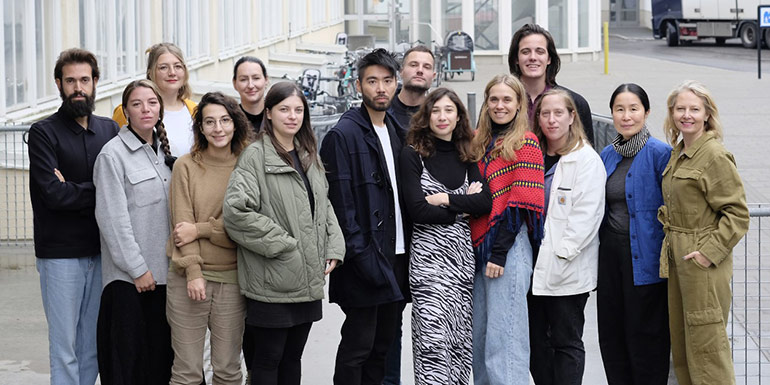
The curators of The Konstfack Degree Exhibition 2022. Photo: Bitte Andersson
Topic
For the academic year 2021/2022, CuratorLab forms the team of curators for one of the most anticipated art events in Stockholm: The Konstfack Degree Exhibition 2022, which includes the Master's degree programmes: Fine Art; CRAFT! (Textile, Ceramics and glass, Jewellery and Corpus); Spatial Design; Individual Study Plan in Design, Teacher Education in Visual Arts and Sloyd, and Visual Communication. Through a mix of dialogues, studio visits, feedback, crit sessions, group work, field trips and seminars, we delve into the ideas and visions of over 85 graduates across these fields.
The Konstfack Degree Exhibition is one of the most important and widely attended art events of the Stockholm art community. It also produces a lot of hopes, aspirations and expectations - some of them impossible to fulfill. We explore questions around the possible ways of presenting this diverse educational setting and opening up the process rather than only celebrating its final results. How can we combine the intimacy of learning and failing and the array of materials and techniques within a situated context of a given space-time? How to understand - paraphrasing Audre Lorde — our interdependence in relation to our own individual power and creativity? How to negotiate between students' desires for self-expression and the curatorial impulse to identify narratives? How to refrain from the reenactment of old hierarchies and think of a unique place of art schools in the ecosystem of art and beyond it? How to combine large-scale production with a setting that benefits all graduates? How to work professionally, efficiently but critically within the frameworks of an established institution?
Brown Island speaking at the dialogical space curated by CuratorLab
Participants : Chen Shuyu / Malmö, Una Mathiesen Gjerde / Oslo, Lovro Japundžić / Zagreb, Lauren Johnson / Stockholm / Elk Glade, Colorado, Matilda Kästel / Stockholm, Lina Louisa Kraemer / Mainz, Martin Ku / Berlin, Reyhaneh Mirjahani / Gothenburg / Tehran, Res / Stockholm / Brooklyn, Eleni Riga / Athens, Marta Świetlik / Warsaw, Krisztián Gábor Török / Budapest
Term 2020/2021
A year in which we edited two books on the archeology of our profession
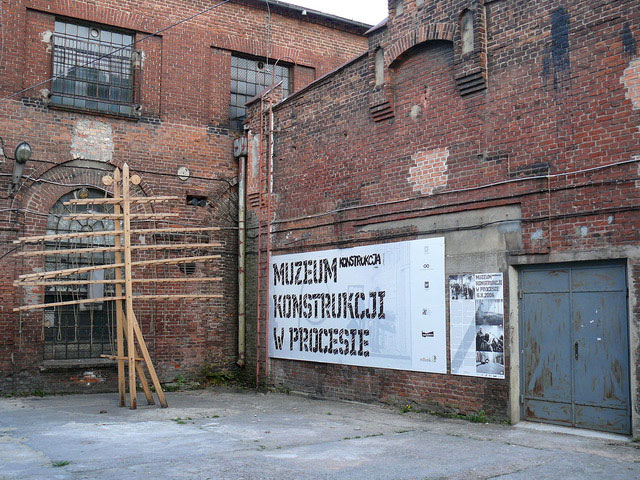
Construction in process, Łódź, Poland, 1981
Topic
CuratorLab embarked on a year-long research tracing the professional archaeology of some of the senior ground-breaking curators. We dug into a number of instrumental exhibitions and other projects, which on the one hand introduced decolonial and other non-hegemonic approaches in Sweden, and on the other hand anti-monumental and anti-extractivist curating in the public realm in Europe and the US. We met and interviewed practitioners who have made a mark on both art and curating of their time, and still remain less known. This research conducted in the pandemic year lead us to publish two books honoring and problematizing their legacy.
Participants Anna Mikaela Ekstrand / Stockholm / New York, Giulia Floris / Rome, Edith Fung / Hong Kong / Derry, Julius Lehmann / Münster, Marc Navarro Fornos / Barcelona, Raluca-Simina Neagu / Bucharest / London, Hanna Nordell / Uppsala / Stockholm, Marja Rautaharju / Helsinki, Erik Sandberg / Stockholm.
Final publications, co-published by Sternberg Press and Konstfack Collection (winter 2022)
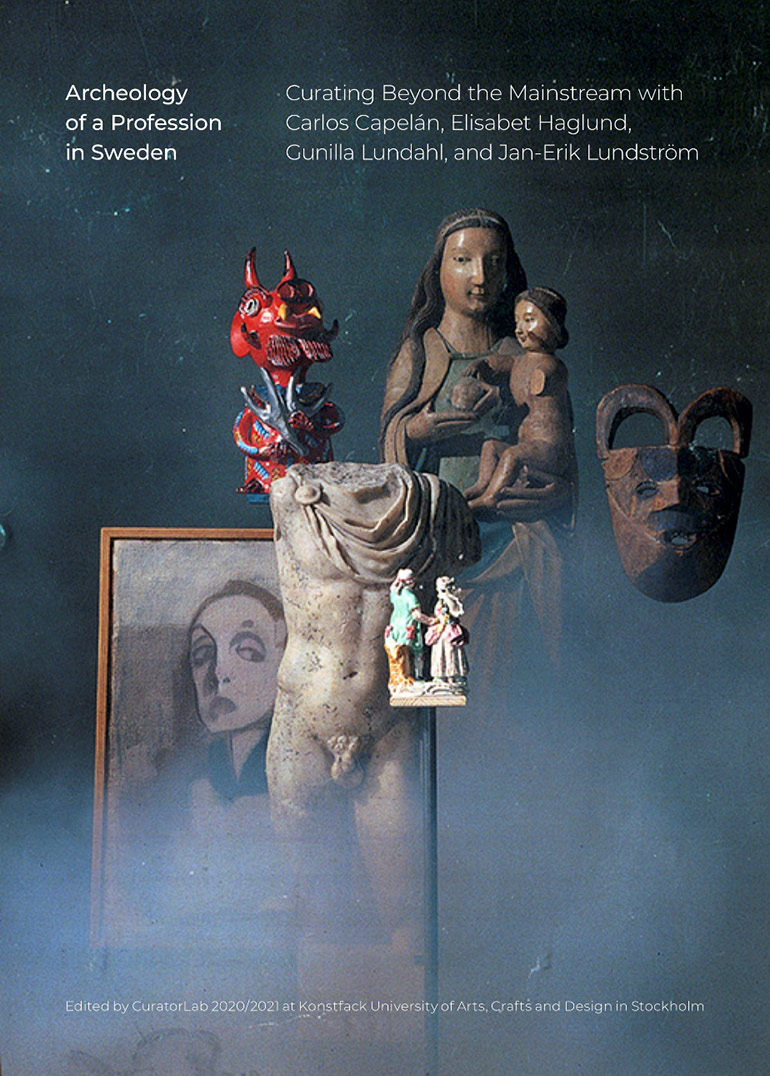
Archeology of a Profession in Sweden | The MIT Press
Book Cover: Gunilla Lundahl, Himla skönt.
Photo: Olof Wallgren/Riksutställningar. Design by Jozefina Chetko.
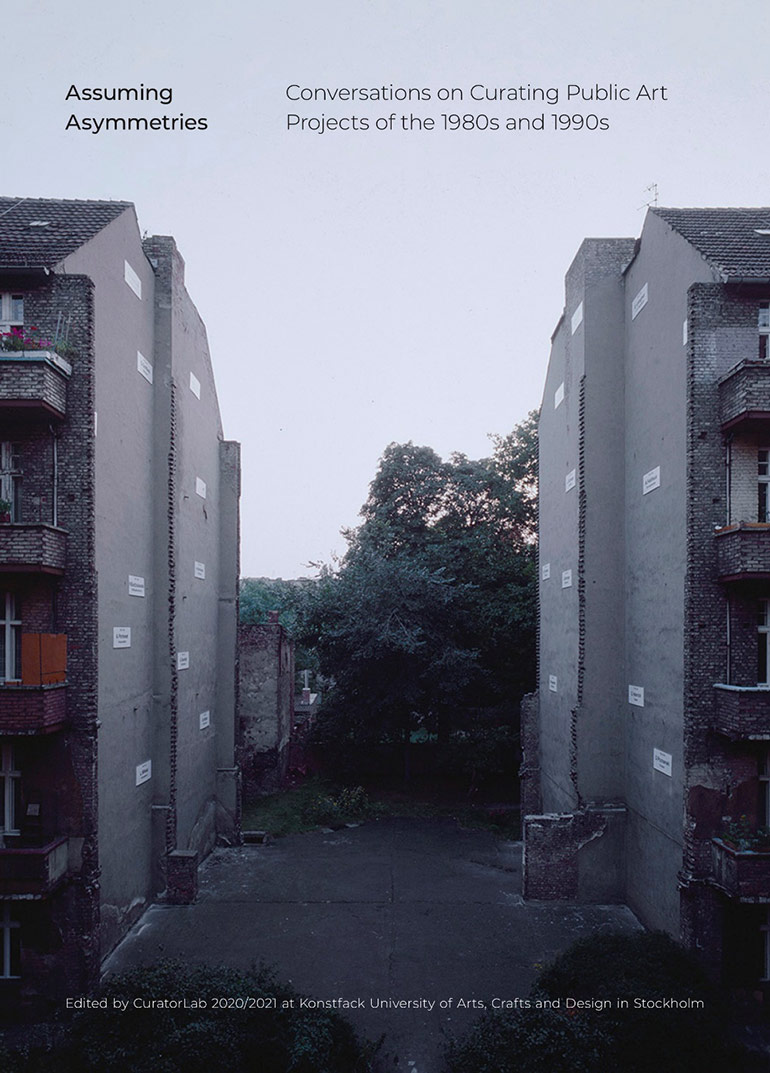
Assuming Asymmetries | The MIT Press
Book cover: Christian Boltanski, The Missing House,
Große Hamburger Straße 15/16, Berlin, 1990, Photo: © Werner Zellien / Endlichkeit der Freiheit. Design: Jozefina Chetko
PDF access
Public program: An Archaeology of a Profession. Conversations with ground-breaking senior curators.
A two-day online program with: Valerie Smith, Mary Jane Jacob, Elisabet Haglund, Carlos Capelán, Jan-Erik Lundström.
Term 2019/2020
A year in which we tested advocacy as a curatorial form
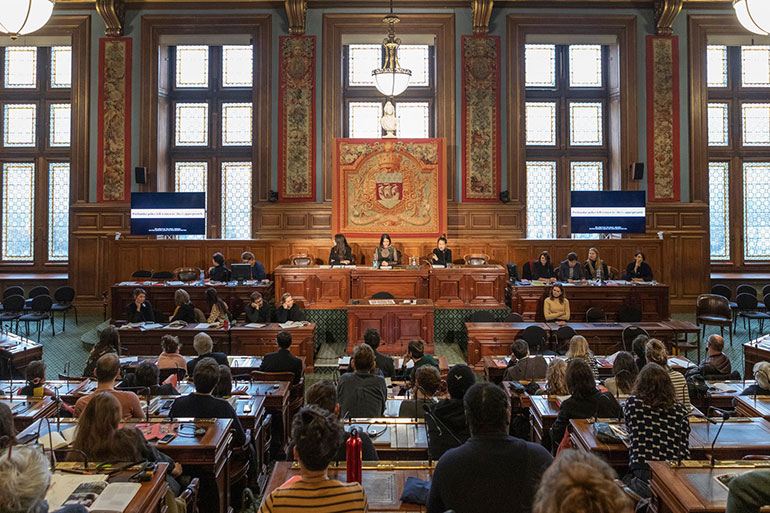
2019 Visible Temporary Parliament, Hôtel de Ville, Paris, photo by Benoit Laurent
Topic
In autumn 2019 CuratorLab participants acted as advocates for socially engaged practices shortlisted for the 2019 Visible Award. We tested advocacy as a form of care and responsibility defending artistic projects of Richard Bell, Cooking Sections, Luke Ching, Forensic Architecture, Daniel Godínez-Nivón,Trampoline House, Emily Jacir, Marisa Morán Jahn, Otobong Nkanga, Jasmeen Patheja. This experience made us raise the question of how can art institutions and practices be reformatted beyond display towards agency and engagement? Over the course of the Covid-19 crisis, our frenzied world has morphed into a global stagnation. The sweet fruits of connectivity, cheap travel, and breakneck production and consumption have been put on hold overnight. In this turbulent time, we ask ourselves: what is indispensable for Translocal solidarity and collective action? Which materials, ways of doing, and values can be prioritized over national or supranational apparatuses, and which strategies of curation, activation, and conservation can we craft as artists and curators?
Matteo Lucchetti: guest lecturer
Curator, art historian, and writer. His main curatorial interests are focused on artistic practices that redefine the role of art and the artist in society. Since 2010, Lucchetti is chief curator, with Judith Wielander, the Visible project, a research endeavor and the first European biennial award devoted to socially engaged artistic practices in a global context, initiated and supported by Pistoletto Foundation, Biella and Fondazione Zegna, Trivero.
Judith Wielander: guest lecturer
An independent curator based in Brussels. Her main curatorial research is focusing on the intersection of Art and Social Engagement. She has been curator at Cittadellarte – Fondazione Pistoletto from 2002 to 2010. Judith Wielander has initiated in 2009 in dialogue with Michelangelo Pistoletto the Visible Project and co-curates it since 2010 with Matteo Lucchetti.
Participants: Alba Martinez Folgado / Uppsala, Benjamin Thomas / Bristol / London, Carlota Mir / Vienna / Stockholm, Carolina Lio / London, Claudia Stübi / Basel, Pia Würthwien / Berlin, Sara Alberani / Rome, Sofia Steinvorth / Lisbon, Tal Gilad / Stockholm.
Democracy and Dramaturgy, Notes on Curating Socially Engaged Art
CuratorLab final online program 3-4 June 2020
Term 2018/2019
A year in which we worked on traces of migration in the art collection in Malmö
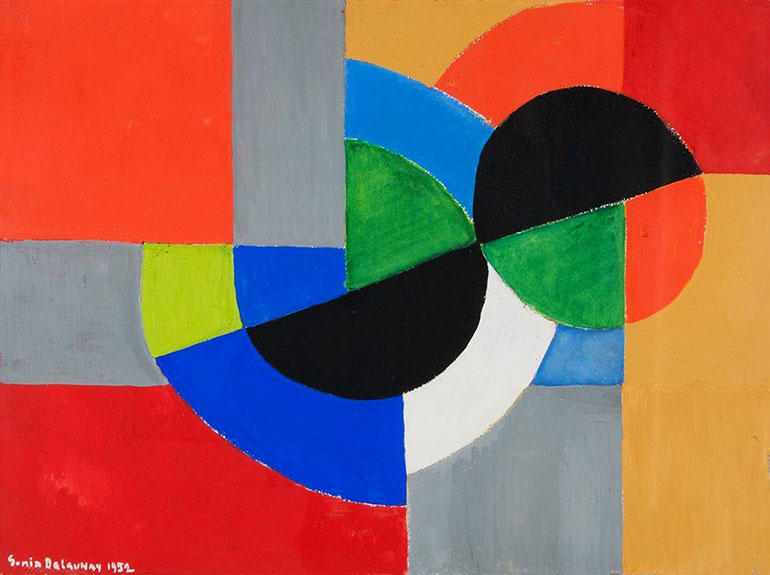
Sonia Delaunay, Rythme couleur, Migration: Traces in an Art Collection, Tensta konsthall
Topic
Throughout the academic year, 2018-2019, CuratorLab participants worked alongside the curators Maria Lind, Cecilia Widenheim and Joanna Warsza developing the mediation and public programme for the exhibition, Migration: Traces in an Art Collection, shown at Tensta konsthall and Malmö Konstmuseum in spring and autumn 2019. The starting point of the research was a question of how to work curatorially with public art collections by responding to notions of the public, publicness, the commons, the counter-public, the private, the shared, and the owned. Every participant was engaged in conceptual and hands-on research on the third biggest collection of 'Nordic' art in Sweden, from visiting its storage, having a conversation with the conservators and technicians, to develop their own projects.
The research began by considering an event in 1945, when the staff of Southern Sweden's largest museum, Malmö Museer, transformed the institution into a refugee center for those who had survived concentration camps in Germany and had come to Sweden on so-called 'white buses'. From there, the participants outlined research topics and readings, asking what the role of the curator is in actualising and problematising collections, while also developing the exhibition's programme, which considered exile, migration, displacement, and art travels in the globalised world.
Participants: Jeong Chae / Stockholm & Seoul, John Heffernan / Hull, Vasco Forconi / Rome, Lotte Løvholm / Copenhagen, Jari Malta / Malmö, Raquel Villar Pérez / London, Eva Seijas / La Coruña, Kasia Sobczak / Lisbon / Gdańsk
CuratorLab final public program, May-June 2019, Tensta konsthall
Term 2017/2018
A year in which we read Alexandra Kollontai writings on comradely love and revolution
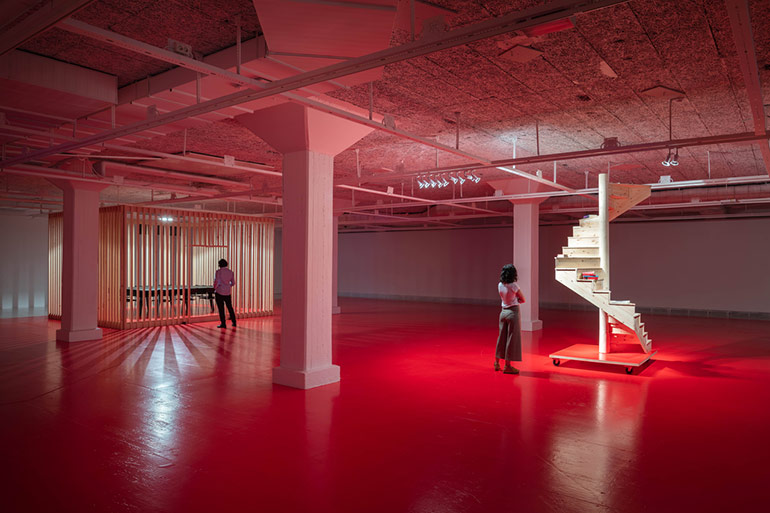
Dora Garcia, Red Love, exhibition view, Tensta konsthall, 2018
Topic
CuratorLab 2018-2017 participants together with writer Michele Masucci, collectively revisited the ideas of a Russian revolutionary and feminist, Aleksandra Kollontai, exploring topics such as sexual politics, free love, and motherhood. Kollantai was a prominent Russian revolutionary, a commissar of Social Welfare after the October revolution in 1917, and a long-term Soviet ambassador to Sweden. As a cofounder of the Zhenotdel, the ‘Women's Department’ in the communist party, she introduced abortion rights, secularized marriage, and provided paid maternity leave. Kollontai considered ‘comradely love’ to be an important political force and foundational to shaping social bonds beyond the limitations of property relations.
As a result our research we published a reader on the subject, titled Red Love, stemming from their year-long collaboration with Tensta konsthall, leading to Dora García's exhibition, Red Love. We also developed a related public programme to the show. A number of artists and thinkers revisited Kollontai's ideas throughout the book, on the politics of love and their relation to current political, social, and feminist struggles. The publication also includes the biographical play, Kollontai, written in 1977 by distinguished Swedish writer, Agneta Pleijel.
Michele Masucci: guest lecturer
Artist, researcher and Ph.D. candidate at Karolinska Institutet and the Academy of Fine Arts Vienna, as well as translator of Italian political philosophy into Swedish, including Paolo Virnos 'Grammar of The Multitude'.
Participants: Federico Del Vecchio / Naples, Alexandra Grimes / Birmingham, Nicholas Jones / Oslo, Alessandra Prandin, Paris/Venice, Dimitrina Sevova, Zurich/Sofia, Malin Sujeewa Huber / Stockholm, Sofio Tabatadze, Tbilisi/Berlin, Martyna Nowicka-Wojnowska / Krakow, Hannah Zafiropoulos / London
Final publication: Red Love: A Reader on Alexandra Kollontai / Kollantai: A Play by Agneta Pleijel (Sternberg Press and Konstfack Collection, 2020)
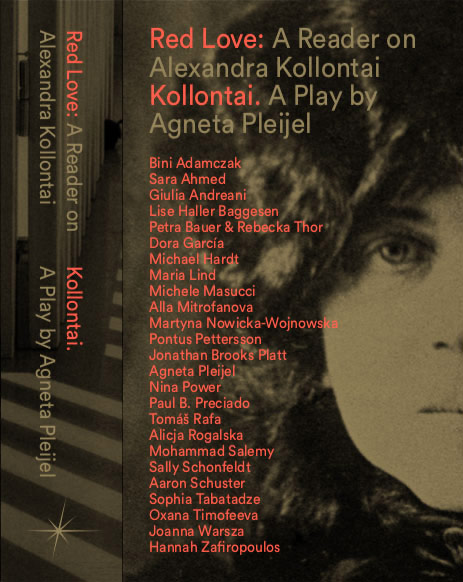
Open access file available on DiVA
Term 2016/2017
A year in which we re-staged an Operaist Trail with an artist Rossella Biscotti
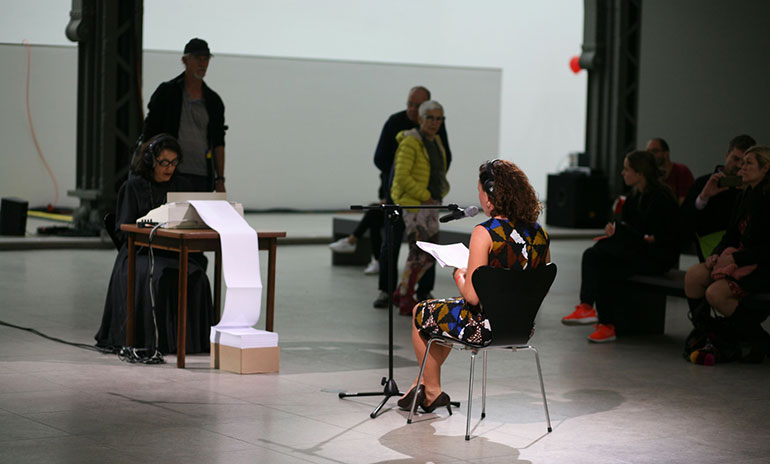
CuratorLab presents The Trial - II Processo, 2010-2017, Rossella Biscotti at Hamburger Bahnhof, Berlin, 2017, photo by Maeshelle West Davies
Topic
Throughout the academic year 2016/2017 we have been working together with curators Maria Lind, Joanna Warsza and artist/writer Michele Mascucci on re-staging The Trial / Il Processo (2010/2017), a performative piece by Italian artist Rossella Biscotti, based on the original courtroom recordings from the 1982–84 trial of members of Autonomia Operaia in Rome. CuratorLab organised related research, reading groups, and meetings, prepared the transcripts and finally enacted The Trial at Tensta konsthall in Stockholm first as an open rehearsal, and then as a performance at the Hamburger Banhof in Berlin.
Guest lecturers: Petra Bauer, Rossella Biscotti, Doreen Mende, Suhail Malik, Ana Teixeira Pinto, Annika Eriksson.
Participants: Florin Bobu / Iasi, Domna Gounari, Tessaloniki / Madelene Gunnarsson / Stockholm, Nikki Kane / London, Jérôme Malpel / Paris, Christine Langinauer / Helsinki, Saima Usman / Stockholm
Term 2015/2016
A year in which we curated the Open House of IASPIS
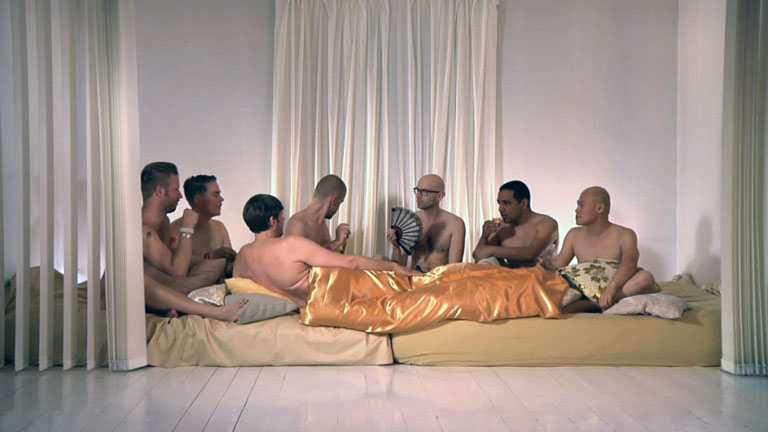
Iaspis Open House Spring 2016
Topic
Iaspis Open House Spring 2016 curated by CuratorLab. This edition of the Open House took on the concept of openness, hospitality, transparency and vulnerability, making access not only to the artists' studios, but the institution as such and bringing the new public in-house. In a series of day and night events Open House presented the work in progress of Iaspis artists in residence program, as well as hosted the performative interventions of the Stockholm emerging scene, with its collectives contributing with food, self-made publication on demand, and a music repertoire.
The main idea was to refer to the Swedish tradition of so-called Open House, when people organize a party open to everybody, an exhibition of their domicile, bringing the world into their life, and their life to the world. When the Iaspis programme opens the doors of its studio residencies for a day, it is an invitation to take part in the on-going artistic processes. The Iaspis studio programmme's focus is 'research based'; a place of investigative activity that offers time off from the production line of making. The grant holders can spend their time at the residency to reflect, explore and enter into unconditional processes without the need for results. They initiate new projects in local partnerships or work on on-going projects.The studio and the context created by the Iaspis programmme is in itself a platform for informal and formal meetings with Swedish and international artists, curators, writers and with professional audiences. The programme's residence activities are therefore about process itself, with the aim to add to a greater internationalization of the applied and visual art scene in Sweden.
Anna Tomaszewska: visiting lecturer
Curator, producer, researcher, former deputy director of the Polish Institute in Stockholm, where she was responsible for visual arts, architecture and design. Board member of Swedish organisation Mossutställningar, which focuses on public art. (Parental replacement for Joanna Warsza)
Participants: Rowan Geddis / London, Thomas Hare / Stockholm, Sookyoung Huh Stockholm/Seul, Carin Kallenberg / Stockholm, Alexandra Laudo / Barcelona, Raquel Benito Machtus / Madrid, Sheena Malone / Dublin, Maryam Omrani / Stockholm and Teheran
Advisors: Sara Arrhenius, Behzad Khosravi, Camilla Larsson, Magdalena Malm, Martí Manen, Robin McGinley, Maria Lind, Niclas Östlind, Jacek Smolicki, Anna van der Vliet, Malin Zimm
Iaspis Open House Spring 2016 curated by CuratorLab
Term 2014/2015
A year in which we worked on Frederick Kiesler’s retrospective
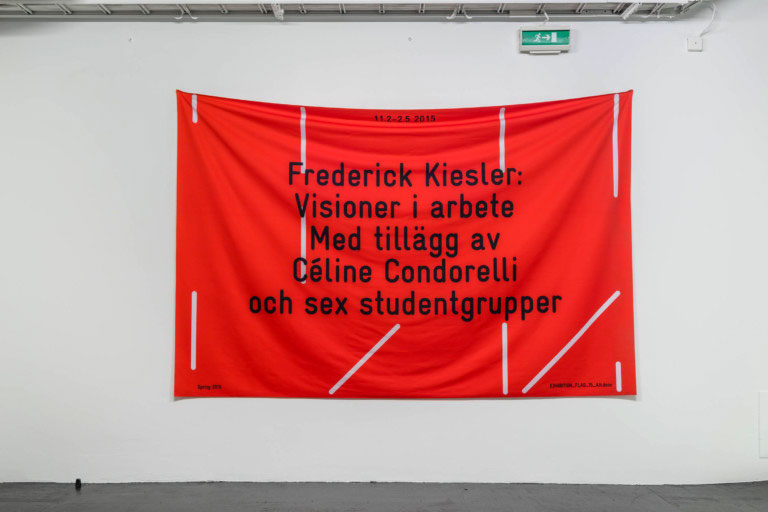
Frederick Kiesler: Visions at Work at Tensta konsthall, photo by Jean-Baptiste Béranger
Topic
Frederick Kiesler: Visions at Work Annotated by Céline Condorelli and Six Student Groups including CuratorLab at Tensta konsthall
In winter 2015 Tensta konsthall showed the first exhibition in Sweden of Frederick Kiesler's genuinely transdisciplinary work. Kiesler (1890–1965) was an architect, artist, scenographer, pedagogue, theorist and - not least - a groundbreaking exhibition designer. CuratorLab participants developed own public program of the show spanning from an exhibition in the shop windows in the shopping mall nearby, via reading groups on friendship to the selection of the reading material at the library.
The exhibition featured models and documentations of Kiesler's designs for exhibitions, buildings, interiors, shop-windows, etc. from various periods. The exhibition also included prototypes, including those of his Mobile Home Library and the mass-produced so-called correalist furniture, among others. The focus was on Kiesler's interest in the intersection between art and life and how this manifests in his works. The artist Céline Condorelli, who has a long-time interest in exhibition design and modes of presentation, contributed to the spatial design of the project.
Student groups from KTH Tensta, KTH School of Architecture, Mejan Arc at the Royal Institute of Art, Interior Architecture & Furniture Design and CuratorLab at Konstfack, and a fifth grade at Askebyskolan in Rinkeby were all involved with the exhibition.
Participants: Chiara Nuzzi / Venice, Dorota Michalska /Warsaw, Jacob Hurtig / Goethenburg, Josefin Vargö / Stockholm, Kalliopi Tsipni Kolaza / Athens, Kim Mcaleese / Birmingham, Patrik Haggren / Goethenburg, Samuel Perry / London, Valentina Sansone / Napels, Valeria Mancinelli / Venice
Individual advisors: Roger Connah, Celine Condorelli, Hadrian Garrard, Marina Grzinic, Luigi Fassi, Laura Hatfield, Peter Köhler, Nina Möntmann, Andre Lepecki, Maria Lind, Emily Pethick, Olivia Plender, Jenny Richards, Fredrik Svensk, Claire Tancons
Working groups on:
- Contributing to the creation of Frederick Kiesler's exhibition at Tensta Konsthall
- A study trip to St. Petersburg including a project in the Winter Palace
- Collaboration with Creative Time Summit in Stockholm
CuratorLab 2014 blog
Our various collaborations
In the past years CuratorLab has collaborated with: Moderna Museet, Stockholm; Tensta Konsthall, Stockholm; Index - The Swedish Contemporary Art Foundation, Stockholm: Moderna Bar, NLH Space, Copenhagen, Form Museets Vänner, Stockholm, National Museet, AndPublishing, London, Stockholm Rumanian Cultural Institute, Stockholm, Vessel, Bari; Filmhuset/Svenska Filminstitutet; Andquestionmark, Stockholm, Konsthall C, Stockholm; The Swedish Centre for Architecture and Design, Stockholm, Cigarrvägen 13; Stockholm; Konstapoteket, Stockholm; Leaders in Software and Art, New York; CoCAin Art Review, Poland; Mobile Art Productions, Stockholm; Röda Sten, Gothenburg; Point Ephémère, Paris; Platform Garanti, Istanbul; Onomotopee, Eindhoven, Apexart, New York; Botkyrka Konsthall, Stockholm; Centre for Contemporary Arts, Glasgow; les presses du reel, Paris; Riksutstallningar, Gotland; Färgfabriken, Stockholm; Slakthusateljeérna, Stockholm, Open Arts Foundation, Plovdiv, Manifesta7, Bolzano, Manifesta 10 in St. Petersburg, Creative Time Summit Stockholm
Our visiting lecturers over the years
Beatrice von Bismarck, Petra Bauer, Jonna Bornemark, Eva Gonzalez-Sancho, Lena Jonson, Janna Graham, Jesper Nordahl, Rasmus Nielsen, Tone Olaf Nielsen, Emily Roysdon, Maria Lind, Binna Choi, Sofia Hernandez Chong Cuy, Marta Kuzma, Marta Edling, Annika Enqvist, Warren Neidech, Kim West, Barbara London, Mark Fisher, Olivia Plender, Annie Fletcher, Lars Bang Larsen, Nina Möntmann, Goldin + Senneby, Mattin, Charlotte Bydler, Raimundas Malašauskas, Paul O'Neill, Martí Manen, Andre Lepecki, Rick Lowe, Andrea Philips, Maria Lantz, Marc Herbst, Chris Dercon, Gabi Ngobo, Carol Tulloch, Chus Martínez, Søren Grammel, Gavin Wade, Anthony Huberman, Lívia Páldi, Diana Baldon, Andrea Phillips, Elena Tzotzi, Gabi Ngobo, Stealth.unlimited, Martin Schibli, Lisa Rosendahl, Laurel Ptak, Sofia Victorino, Abdellah Karroum, Staffan Lundgren, Mats Sternstadt, Power Ekroth, Azat Sargsyan, Sinziana Ravini, Nataša Petrešin-Bachelez, Petra Bauer, Fredrik Liew, Rebecca Gordon Nesbit, Ewa Majewska, Helena Selder, Edi Muka, Markus Degerman, Zoran Eric, Magdalena Malm, Fredrik Svensk, Sofia Wiberg, and many others.
CuratorLab homepage
curatorlab.se